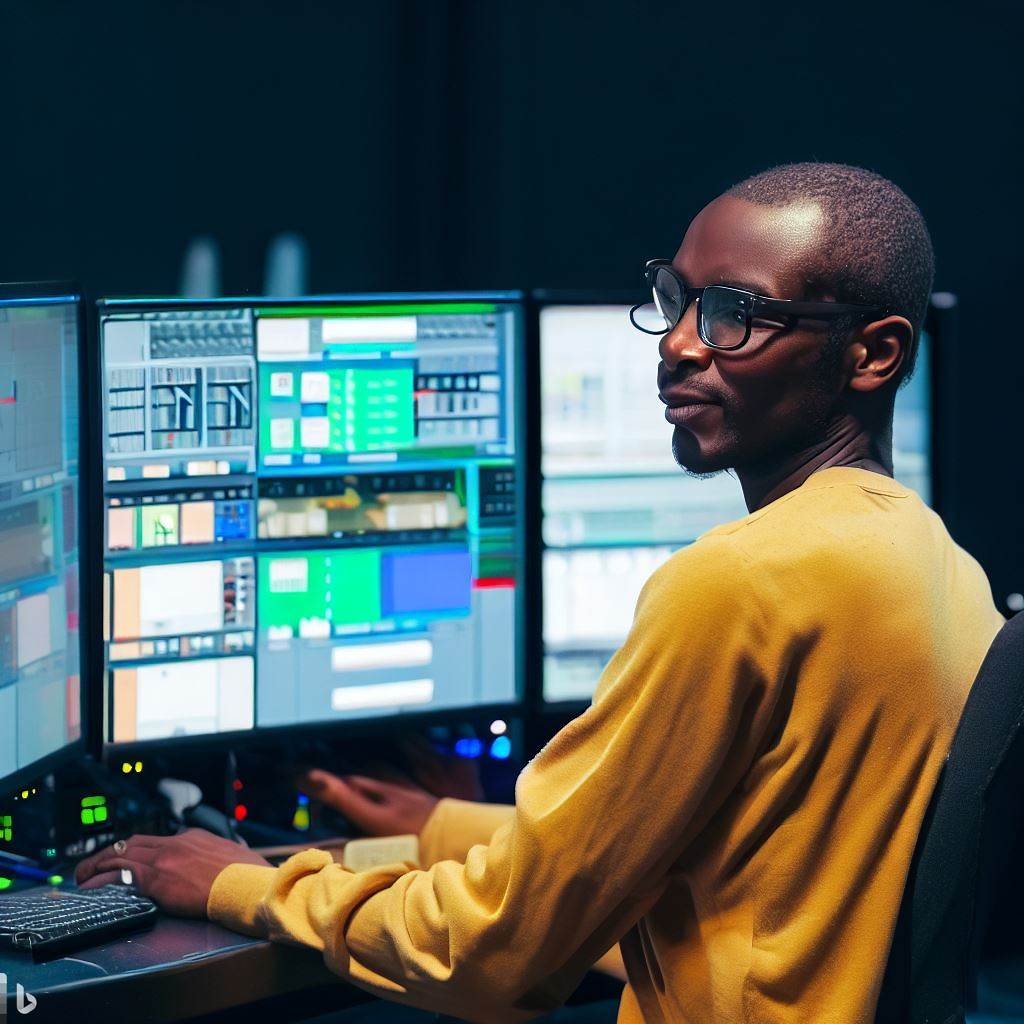Introduction
TV editing jobs in Nigeria have become a significant aspect of the media industry, offering numerous opportunities for professionals.
With the growing demand for quality content, the role of TV editors has become vital in shaping the narrative and visual appeal of television shows.
This blog post aims to provide an overview of the current state of TV editing jobs in Nigeria, highlighting the prospects and challenges faced by individuals in this field.
Brief Explanation of the Topic
TV editing jobs involve the post-production process of television shows, where professionals manipulate and arrange video footage, audio, and visual effects to create a polished final product.
In Nigeria, this industry has witnessed immense growth due to the rise in local content production and the emergence of new television stations.
With advancements in technology and increasing viewership, TV editing jobs have become more relevant and sought-after in the country.
Purpose of the Blog Post
The purpose of this blog post is to shed light on the current state of TV editing jobs in Nigeria.
It will explore the opportunities available for aspiring TV editors and discuss the challenges they might face in pursuing a career in this field.
By providing insights and information, this post aims to guide individuals interested in TV editing and contribute to the growth of the industry in Nigeria.
Overview of the TV industry in Nigeria
The Nigerian TV industry has experienced significant growth and development over the years. It has become a vital part of the country’s entertainment and media landscape.
With a population of over 200 million people, Nigeria presents a large market for television content.
This has attracted both local and international broadcasters, leading to the emergence of numerous TV stations.
One of the key players in the Nigerian TV industry is the Nigerian Television Authority (NTA), the country’s national broadcaster. NTA operates various TV channels that cater to different audience segments.
Overview of the Nigerian TV industry
Aside from NTA, there are several privately-owned TV stations in Nigeria, such as Channels TV, Silverbird TV, and Africa Magic.
These stations offer a diverse range of programming, including news, entertainment, sports, and dramas.
The rise of satellite and cable TV platforms has also contributed to the growth of the industry.
Pay TV providers like DStv and GOtv offer a wide selection of local and international channels, providing viewers with more options.
Furthermore, the advent of digital television has transformed the TV industry in Nigeria. With the digital switchover, viewers can now access more channels and enjoy better picture and sound quality.
The growth and development of the industry over the years
The Nigerian TV industry has evolved significantly since its inception. In the early years, there were only a few terrestrial TV stations, which limited viewers’ options.
However, with the liberalization of the broadcasting sector in the 1990s, more stations were established, leading to increased competition and improved programming quality.
Additionally, the rise of local content has been a significant driver of growth in the industry.
Nigerian TV shows, such as soap operas, reality shows, and comedy skits, have gained popularity not only in Nigeria but also across Africa.
The industry has also witnessed advancements in production techniques and equipment.
Producers now have access to modern editing software and high-tech cameras, enabling them to create more visually appealing content.
The impact of globalization on the industry
Globalization has had a profound impact on the Nigerian TV industry.
It has opened up opportunities for collaboration between local and international production companies.
Nigerian TV shows, such as Nollywood movies and reality TV formats, have gained international recognition.
This has led to partnerships with foreign broadcasters and distribution on international platforms like Netflix.
Furthermore, globalization has facilitated the export of Nigerian TV content to other African countries and the diaspora.
This has contributed to the growth of the Nigerian entertainment industry as a whole.
However, globalization also presents challenges for local TV editing jobs, as international production companies may opt to bring in their own editors or outsource editing to other countries.
Basically, the Nigerian TV industry has experienced significant growth and development over the years.
It has evolved from a limited number of terrestrial stations to a diverse and competitive landscape with various digital platforms.
Globalization has opened doors for international recognition and collaboration while presenting challenges for local job opportunities.
Read: Demystifying the Role of a Television Producer in Nigeria
Understanding TV Editing Jobs
In the world of television production, TV editing plays a crucial role in ensuring a seamless and engaging viewing experience for the audience.
TV editing jobs involve the process of selecting, arranging, and manipulating video footage to create a cohesive and captivating final product.
Defining and Explaining the Role of a TV Editor
A TV editor is responsible for transforming raw footage into a polished and professional television show or program.
They work closely with the director and other stakeholders to understand their vision and bring it to life through editing techniques such as cutting, trimming, and adding transitions.
Importance of TV Editing in the Production Process
TV editing is vital to the production process as it focuses on enhancing the storytelling aspect of a television program.
It helps in creating a narrative flow, maintaining pacing, and building emotional connections with the audience.
Without proficient TV editing, a program may lack coherence and fail to engage viewers.
Furthermore, TV editing allows for the removal of any unwanted footage, mistakes, or technical errors, ensuring that the final product is of the highest quality.
It helps in creating a captivating viewing experience by selecting the most impactful shots and arranging them in a logical sequence.
Skills and Qualifications Required for TV Editing Jobs
To excel in TV editing jobs, individuals need to possess a combination of technical skills, creativity, and attention to detail.
Here are some of the key skills and qualifications required:
- Proficiency in video editing software such as Adobe Premiere Pro, Final Cut Pro, or Avid Media Composer.
- Strong understanding of storytelling techniques and visual aesthetics.
- Excellent knowledge of different video formats, codecs, and frame rates.
- Ability to work under pressure and meet tight deadlines.
- Attention to detail to ensure precise cuts, smooth transitions, and accurate synchronization of audio and video.
- Good communication skills to collaborate effectively with the director and other members of the production team.
- Flexibility to adapt to changing requirements and implement feedback from stakeholders.
In addition to these technical skills, a TV editor should have a passion for storytelling and the ability to understand the target audience’s preferences.
They must also stay updated with the latest trends and advancements in the field of TV editing to deliver innovative and high-quality work.
Generally, TV editing jobs are essential in the television production process as they shape the final product and create a compelling viewing experience.
TV editors require a combination of technical skills and creativity to excel in their role.
With the growth of the television industry in Nigeria, the demand for skilled TV editors is expected to rise, presenting exciting opportunities in this field.
Read: How to Succeed as a Television Producer in Nigeria
Challenges Faced by TV Editors in Nigeria
In Nigeria, TV editing jobs are faced with numerous challenges that hinder their growth and development in the industry.
Some of these challenges include:
Lack of Formal Education and Training Opportunities for Aspiring TV Editors
One major challenge faced by TV editors in Nigeria is the lack of formal education and training opportunities.
Many aspiring editors do not have access to proper educational programs or institutions that offer specialized training in TV editing.
Limited Access to Modern Editing Technology and Software
Another challenge is the limited access to modern editing technology and software.
Many TV editors in Nigeria struggle with outdated equipment and software, which hampers their ability to deliver high-quality work and meet industry standards.
Limited Job Opportunities and Competition in the Industry
In Nigeria, there are limited job opportunities and fierce competition in the TV editing industry.
This makes it difficult for talented editors to secure stable employment and make a successful career in editing.
Unfavorable Working Conditions and Low Job Security
TV editors in Nigeria often face unfavorable working conditions and low job security.
They are sometimes subjected to long working hours, low wages, and inconsistent employment contracts, which can be disheartening and demotivating.
These challenges faced by TV editors in Nigeria can significantly affect their professional growth and hinder the development of the television industry as a whole.
However, steps can be taken to address these challenges and create a conducive environment for TV editors to thrive.
Addressing the Challenges
Efforts should be made to provide formal education and training opportunities for aspiring TV editors in Nigeria.
Educational institutions and training centers should develop specialized programs to equip editors with the necessary skills and knowledge.
There should also be an emphasis on upgrading editing equipment and providing access to modern editing technology and software.
This will enable TV editors to produce high-quality content and stay competitive in the industry.
Furthermore, the industry should create more job opportunities and reduce the competition in the field.
This can be achieved by promoting collaborations between production houses, television networks, and editors, ensuring a fair distribution of work and opportunities.
In addition, it is crucial to improve working conditions and job security for TV editors.
Employers should provide fair wages, reasonable working hours, and contracts that guarantee job stability. This will motivate editors and enhance their productivity and dedication to their craft.
Essentially, the challenges faced by TV editors in Nigeria hinder their professional growth and the overall development of the industry.
However, through the provision of formal education, access to modern technology, increased job opportunities, and improved working conditions, these challenges can be overcome, allowing TV editors to thrive and contribute to the growth of the Nigerian television industry.
Read: Behind the Scenes: A Day in the Life of a Nigerian TV Producer

Opportunities for TV editors in Nigeria
In recent years, the field of TV editing in Nigeria has seen tremendous growth and presents numerous opportunities for talented individuals in this field.
The demand for high-quality content on television has skyrocketed, creating a need for skilled TV editors to bring out the best in these productions.
The positive aspects of TV editing jobs in Nigeria
Firstly, the positive aspects of TV editing jobs in Nigeria are plentiful.
TV editors are responsible for shaping the narrative and visual experience of a television show, giving them the power to leave a lasting impact on the audience.
Their work can enhance the storytelling, create suspense, and evoke emotions, making TV shows more engaging and successful.
The increasing demand for high-quality content on television
The increasing demand for high-quality content on television has created a thriving industry and opened doors for aspiring TV editors.
Nigerian viewers are now exposed to a wide range of international TV shows and movies, setting higher standards for local productions.
This demand for quality content has led to an increased focus on improving production values, and TV editors play a crucial role in achieving this goal.
Examples of successful Nigerian TV editors and their achievements
To exemplify the achievements of Nigerian TV editors, we can look at the success stories of some notable individuals.
Michael Ukwuma is one such example. He worked as the lead editor on the hit TV series “Tinsel,” which has gained popularity both locally and internationally.
Ukwuma’s exceptional editing skills have been recognized and applauded, contributing to the success of the show.
Another successful Nigerian TV editor is Chinazo Onuzo, who has received critical acclaim for her work on the TV series “The Men’s Club.”
Publish Your Professional Profile, Business or Brand
Showcase your expertise, gain trust, and boost visibility instantly on Professions.ng.
Publish NowHer ability to seamlessly transition between scenes and create a cohesive narrative has been a key factor in the show’s success.
The potential for freelance and entrepreneurship in the field
Apart from the opportunities within established production houses, there is also potential for freelance and entrepreneurship in the field of TV editing.
As more channels and streaming platforms emerge, the demand for fresh and innovative content increases.
This allows TV editors to explore freelance opportunities, working on a project-by-project basis, and even start their own production companies.
With the right skills and a keen eye for storytelling, TV editors can carve a successful career for themselves in Nigeria’s evolving television industry.
There is an immense potential for growth and recognition as the demand for high-quality content continues to rise.
In general, the state of TV editing jobs in Nigeria is experiencing significant growth and presents numerous opportunities for talented individuals.
The positive aspects of these jobs include the ability to shape narratives and create impactful experiences for the audience.
The increasing demand for high-quality content on television has resulted in a flourishing industry, and successful Nigerian TV editors have achieved remarkable feats.
Additionally, the field also offers potential for freelance work and entrepreneurship, allowing editors to explore their creativity and establish their own businesses.
As the demand for quality content continues to rise, TV editing in Nigeria is a field full of promise and potential.
Read: The Role of TV Producers in Nigeria’s Entertainment Growth
Steps for Aspiring TV Editors to Succeed
Tips and Advice for Individuals Interested in Pursuing a Career in TV Editing
Gaining Experience and Building a Portfolio
- Start by familiarizing yourself with popular editing software such as Adobe Premiere Pro or Avid Media Composer.
- Watch TV shows and films critically, paying attention to the editing techniques used.
- Enroll in formal education programs that offer courses or degrees in film editing.
- Practice your skills by editing footage from various sources, such as short films or YouTube videos.
- Collaborate with other aspiring filmmakers by joining local film clubs or online communities.
- Seek internships or entry-level positions at TV stations, production companies, or post-production houses.
- Create a professional website or online portfolio to showcase your best editing work.
- Participate in film editing competitions or film festivals to gain recognition and exposure.
- Consider volunteering your editing skills for nonprofit organizations or student film projects.
- Continuously update your skills by attending workshops, webinars, or online tutorials.
Networking Opportunities and Industry Events
- Join professional organizations like the Nigerian Film and Video Editors Guild to connect with industry insiders.
- Attend film festivals, conferences, or conventions related to the TV and film industry.
- Engage with other professionals on social media platforms like LinkedIn, Twitter, and Facebook.
- Participate in local industry events, workshops, or seminars.
- Network with directors, producers, and cinematographers to expand your connections.
- Volunteer at film screenings or industry events to meet influential people in the field.
By following these steps, aspiring TV editors in Nigeria can increase their chances of success in the industry.
It’s crucial to continuously improve your skills, gain experience, and build a strong portfolio to showcase your talent.
Networking and attending industry events will open doors to new opportunities and collaborations.
Remember, perseverance and dedication are key traits to develop in this competitive field. With passion and hard work, aspiring editors can make their mark in the exciting world of TV editing.
Find Out More: Emerging Trends in Television Editing in Nigeria
Conclusion
The state of TV editing jobs in Nigeria today is promising and growing rapidly.
The blog post highlighted the main points such as the increase in demand for quality editing skills, the rise of digital platforms, and the importance of TV editing in the Nigerian TV industry.
TV editing plays a crucial role in enhancing the overall quality of TV programs. It ensures smooth transitions, eliminates errors, and adds creativity, making the content more engaging for the viewers.
Nigerian TV industry recognizes the significance of skilled TV editors for producing high-quality content.
Considering TV editing as a potential career path can lead to numerous opportunities in the Nigerian TV industry.
The demand for talented TV editors is high, and with the growth of digital platforms, there are various avenues for showcasing editing skills.
Whether you have a passion for storytelling or a knack for visual creativity, TV editing provides a platform to express your artistic talents.
It offers a chance to be part of an evolving industry and contribute to the growth and success of Nigerian TV.
In a nutshell, TV editing jobs in Nigeria today hold immense potential and offer exciting career prospects.
It is a field that deserves attention, recognition, and consideration from aspiring professionals looking to make their mark in the Nigerian TV industry.
So, why not explore TV editing as your next career move?




